5.7 million U.S. adults have Alzheimer’s disease. Many more have early stages of decline.
Multiple Contributors
There are multiple underlying causes of memory loss and Alzheimer’s disease. Each patient presents a different set of contributors calling for a different combination of interventions.
Source: Walker, J Q.; Keine, D; Sabbagh, M. “DEVELOPMENT, APPLICATION, AND RESULTS FROM A CLINICAL INFORMATICS PLATFORM THAT ENABLES A MULTI-MODAL TREATMENT PROTOCOL FOR ALZHEIMER’S DISEASE (AD).” The Journal of Alzheimer’s and Dementia. 2017
The RestoreU METHOD
The RestoreU METHOD is designed for patients with mild cognitive impairment, mild dementia, or mild Alzheimer’s disease. Our service analyzes patient medical data to create personalized care plans. The care plans consist of recommendations of FDA-approved medications, nutraceuticals, and lifestyle improvements. Each patient is supported through the process with a personal coach.
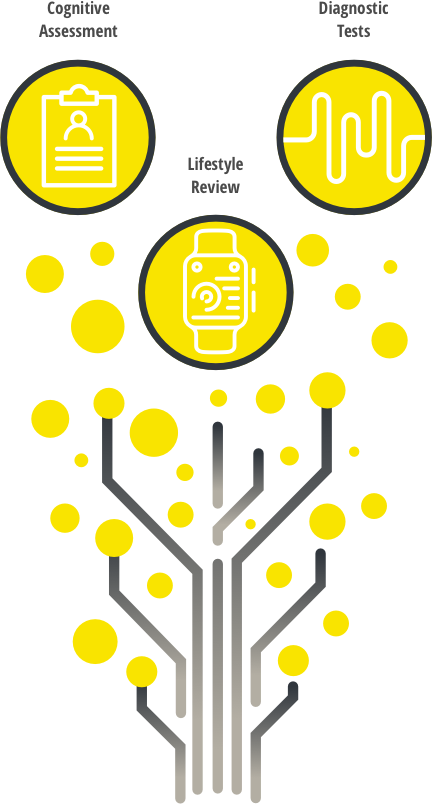
Precision Medicine Engine
Our precision medicine engine uses artificial intelligence to process big data on patients. It applies medical knowledge to recommend evidence-based and highly-personalized treatment paths.

Care Plan Creation
We provide two versions of the personalized care plan: one for the physician and a simplified version for the patient. The physician prescribes the care plan as appropriate and reviews it with the patient.

Cognitive Function
In recent uMETHOD clinical results, 76% of individuals improved their memory or held steady based on standardized cognitive tests. See the research section of our website for more information on results.

Update Care Plan, Repeat
Patients are periodically retested and their care plan is updated every six months.
Research
Every 65 seconds, someone in the United States develops Alzheimer’s disease. Yet, over 300 drugs for Alzheimer’s disease have failed in the FDA process over the last 20 years. It is clear that individual drugs don't work.
Well, what does work then? Multiple studies have demonstrated that personalized combination therapy approaches have great potential in improving outcomes. With precision medicine from uMETHOD, there’s an opportunity to advance care for afflicted individuals.
Early Identification. Combination Therapy. Lasting Patient Benefits.
The RestoreU METHOD is based on many large studies such as the FINGER study, and delivers measurable clinical results.
RestoreU METHOD CLINICAL RESULTS
Percent with steady or improved cognitive status
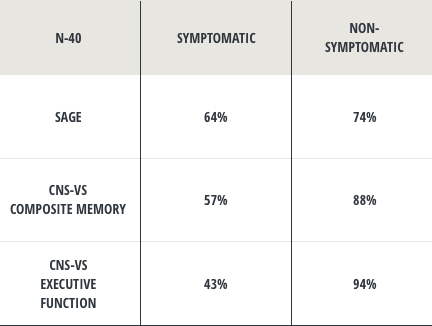
CNS-VS Composite Memory %Tile N=40
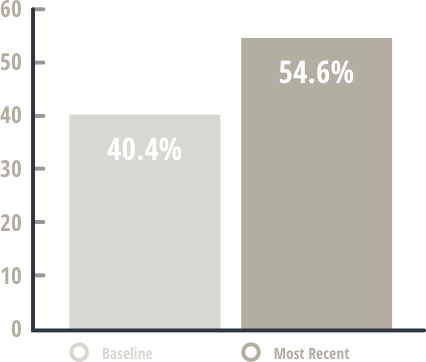
Participants received an average of 2.8 RestoreU METHOD personalized care plans over 8.4 months.
76% of the overall population improved or held steady on repeated CNS-VS composite memory scores, with overall scores improving from 40.4% (below average) to 55.9% (slightly above average).
57% of the MCI subset participants demonstrated improvement or held steady in their CNS- VS composite memory scores.
Source: Walker, J Q.; Keine, D; Sabbagh, M. “DEVELOPMENT, APPLICATION, AND RESULTS FROM A CLINICAL INFORMATICS PLATFORM THAT ENABLES A MULTI-MODAL TREATMENT PROTOCOL FOR ALZHEIMER’S DISEASE (AD).” The Journal of Alzheimer’s and Dementia. 2017
FINGER Study: Lancet 2015
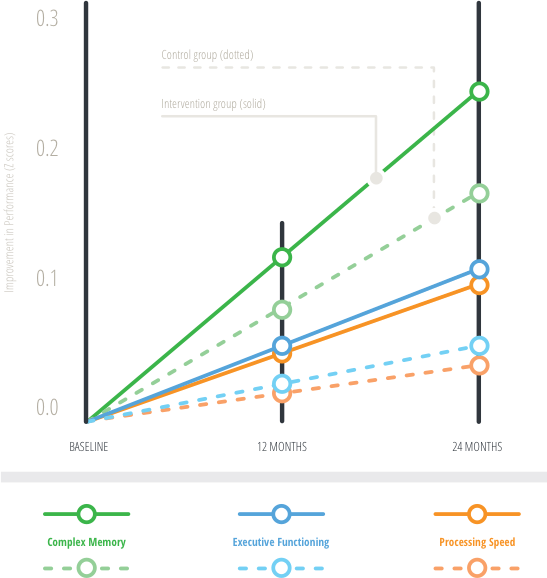
A two-year multi-domain intervention trial follows a personalized treatment comprised of dietary changes, exercise, cognitive training, and vascular risk monitoring.
The intervention group scored 25% higher on neuropsychological tests than the control group.
Executive functioning and processing speed were also higher in the intervention group versus the control group, with the intervention group being 83% and 150% higher.
Sources
Ngandu T, Lehtisalo J, Solomon A, Levälahti E, Ahtiluoto S, Antikainen R, et al. A 2 year multi-domain intervention of diet, exercise, cognitive training, and vascular risk monitoring versus control to prevent cognitive decline in at-risk elderly people (FINGER): a randomized controlled trial. The Lancet. 2015;: p. 2255-2263.
[Data]
Scientific American, April 2017
[Graphic]
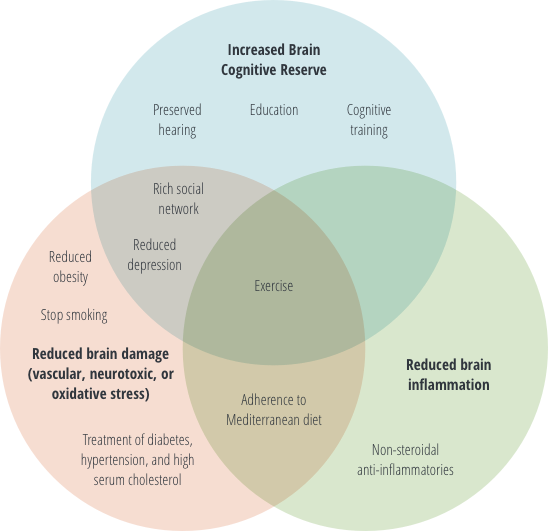
Livingston G, Sommerlad A, Orgeta V, Costafreda SG, Huntley J, Ames D, et al. Dementia prevention, intervention, and care. The Lancet. 2017.
Dementia prevention, intervention, and care: Lancet 2017
A 2017 publication titled “Dementia prevention, intervention, and care” concluded that one-third of dementia cases might be preventable if risk factors are addressed early on. These risk factors include: cardiovascular disease, cerebrovascular disease, metabolic factors, diet, education, and lifestyle.
It is likely that just one cause alone does not lead to dementia or Alzheimer’s, but instead it is the aggregation of multiple risk factors that ultimately lead to the disease. Since one cause does not lead to dementia, one treatment also does not resolve the symptoms or the disease. Instead, a combination of interventions, from pharmaceuticals to lifestyle changes, are needed.
The paper goes on to state the potential intervention window to delay onset of dementia is during the mild cognitive impairment stage. Since the risk factors vary per person, this stage “provides an opportunity for more targeted interventions.”
Scientific Advisory Board
Dr. Marwan Sabbagh
Barrow Neurological Institute
Dr. P. Murali Doraiswamy
Duke University
Dr. Richard Isaacson
Florida Atlantic University
Dr. Ken R. Pelletier
University of California, San Francisco
Dr. Robert Kachko
BoD, American Association of Naturopathic Physicians

